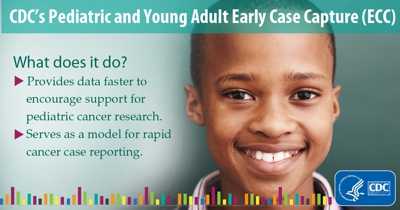Pediatric and Young Adult Early Case Capture
Each year, more than 14,500 children and young adults (birth through 19 years of age) in the United States are diagnosed with cancer. CDC and its partners are committed to improving surveillance on childhood and young adult cancers.
Compared with cancers typically diagnosed in adults, cancer in children is rare. No single center will treat enough children with the same type of cancer to make clinical data in any one geographic area meaningful. To help focus national efforts, CDC created a cooperative program—supported by the Carolyn Pryce Walker Conquer Childhood Cancer Act—to help cancer registries collect and make the data on pediatric and young adult cases available more quickly among states.
This program will help develop a database of cases that is large enough for researchers to study, providing data that could lead to fewer cases of childhood cancer, better treatments, and better survival.
A National System Benefits Everyone
The cooperative program was awarded in 2014 to seven central cancer registries: Kentucky, Louisiana, Minnesota, Nebraska, New York, Rhode Island, and Wisconsin. These registries—
- Submit selected data within 30 days of a patient’s cancer diagnosis.
- Increase electronic reporting from multiple sources, including out-of-state children’s hospitals.
- Monitor and ensure data are complete, timely, and accurate.
- Provide more pediatric and young adult data for research among states.
- Submit non-identifiable data to CDC to help improve the rapid reporting model.
Rapid Reporting Improves Research Time and Quality
The registries also increase the speed of cancer case reporting, receiving electronic reports of cancer cases from—
- Large, out-of-state pediatric hospitals. For example, St. Jude Children’s Hospital gives reports of new cancer cases directly to all seven registries.
- Hospital and independent laboratories.
- Health information exchanges, which move information electronically through a state, region, or hospital system.
- Electronic health record data.
- Diagnostic imaging centers.
What Will Early Case Capture Do?
- Help researchers learn more about the causes of pediatric and young adult cancers, as well as the appropriateness of treatment.
- Use timely, relevant data to inform public health programs and support enrollment in clinical trials for new cancer treatments.
- Provide data that could help lower the rate of pediatric and young adult cancers and increase survival rates.
- Serve as a model for rapid reporting for others conducting cancer surveillance.
More Information
- Cancer Prevention During Early Life
- Childhood Cancers (National Cancer Institute)
- Adolescents and Young Adults with Cancer (National Cancer Institute)
- Data and Statistics: Cancer Among Children
- Evaluating early case capture of pediatric cancers in seven central cancer registries in the United States, 2013.
- Cancer incidence rates and trends among children and adolescents in the United States, 2001–2009
- Page last reviewed: September 6, 2016
- Page last updated: September 25, 2017
- Content source:
- Maintained By:


 ShareCompartir
ShareCompartir

